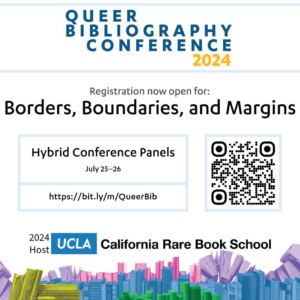eLabs & Community Events

- This event has passed.
UCLA California Rare Book School’s Queer Bibliography Conference
July 25, 2024 12:00 pm – July 26, 2024 1:00 pm Eastern Daylight Time
UCLA California Rare Book School is pleased to host the second annual Queer Bibliography conference, with virtual sessions to be held between July 25-26, 2024. Queer Bibliography makes explicit the connections between queer theories and methodologies and the multifaceted field of bibliography. This year’s conference will focus on CalRBS’s 2024 theme “Borders, Boundaries, and Margins.”
Bibliography is implicitly concerned with notions of space and situatedness: from letters on a page, to the print-shop, to books in circulation. Much queer print culture is concerned with producing spaces for people and information to circulate, and is often explicitly framed as such. Queer bibliography, therefore, is particularly attuned to questions of space, from the intimacy with which print mediates individual identities, to the production and reproduction of communities. It invites consideration of the affordances of liminal spaces created by the materiality of printed texts, as well as the marginal spaces in which texts themselves are created.
This conference explores how the theories and practices of queer bibliography inhabit areas of liminality and in-betweenness, and will interrogate how queer orientations and approaches can reshape the cartography of bibliography and its allied areas of inquiry. Presentations will delve into the ways in which queer bibliography navigates and challenges traditional boundaries, be they geographical, disciplinary, institutional, methodological, or conceptual. How might we queer bibliography to reshape the classification of texts, to interrogate the materiality of textual bodies, to examine margins as both enclosing and unbounding, or to emphasize the centrality of affect in histories or reading and in bibliographical methodologies? Additionally, how might queer bibliography help us push against or question traditional bibliographical practices in archives, book arts studios, bookstores, classrooms, libraries, and museums? And finally, what role does queer bibliography play in shaping community engagement and activist work through textual and material forms?


